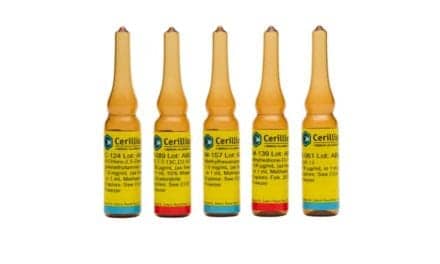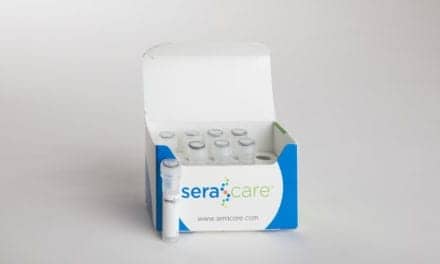Developers explore the potential of blood biomarkers for TBI
Interview by Steve Halasey
In the middle of April, FDA issued a public warning against the use of medical devices marketed to consumers to help assess, diagnose, or manage head injury, including concussion, traumatic brain injury (TBI), or mild TBI.1
TBIs have become a global public health concern. Each year, more than 4.8 million people in the United States visit an emergency department to be evaluated for a suspected TBI, and an estimated 10 million people globally are affected annually by brain injuries.2,3 According to the World Health Organization, TBI could surpass many diseases as the major cause of death and disability by 2020.3 While certain groups of people may be at a higher risk for TBI, the vast majority of brain injuries occur to average people during a car accident or fall.
In its safety communication, FDA warned that certain devices—such as smartphone applications marketed to coaches or parents for use during sporting events—have not been reviewed by FDA for safety and efficacy and could result in an incorrect diagnosis, potentially leading to a person with a serious head injury returning to their normal activities instead of getting medical care. FDA noted that only a limited number of medical devices have been cleared or approved to aid in the diagnosis, treatment, or management of concussion—and all of them require an evaluation by a healthcare professional.4
“There are currently no devices to aid in assessing concussion that should be used by consumers on their own,” said Jeffrey Shuren, MD, JD, director of FDA’s Center for Devices and Radiological Health. “Using such devices can result in an incorrect diagnosis after a head injury that could lead a person with a serious injury to return to their normal activities instead of seeking critical medical care, putting them at greater danger.”5
The safety communication explained that the products of concern include those that claim to assess and diagnose changes in brain function by having an injured person perform tests on a smartphone or tablet-based application to determine a change in physical or mental (cognitive) status, including balance, concentration, memory, speech, and vision.
The agency’s recommendations to athletic coaches, caregivers, consumers, and parents, note that individuals should seek prompt treatment from a healthcare professional if any head injury, including concussion, is suspected.
However, there is a growing need to develop new technologies that can help physicians detect TBIs. Detecting concussions is often difficult because the physical damage may not be obvious, and not all brain injuries are visible on CT scans or other tests used as part of today’s standard of care. Failure to detect TBIs could have implications for a patient’s treatment and recovery.
Developing rapid and objective blood tests that can identify biomarkers released from the brain when injured could help healthcare providers have a fuller picture of a patient’s health when they present in the emergency department with a suspected brain injury.
Banyan Biomarkers, San Diego, is the only maker of blood-based tests for TBI that have received FDA clearance. In April, the company announced that it would provide diagnostic manufacturer Abbott, Abbott Park, Ill, with a nonexclusive license for its two TBI blood biomarkers, ubiquitin carboxy-terminal hydrolase-L1 (UCH-L1) and glial fibrillary acidic protein (GFAP). With the license, Abbott will continue its development of a TBI assessment blood test for use at the point of care and on its core laboratory instruments.
To find out more about the challenges of developing blood-based biomarker tests for TBI, CLP recently spoke to Beth McQuiston, MD, RD, a board-certified neurologist and medical director for diagnostics at Abbott.
CLP: Why does there seem to be a global epidemic of traumatic brain injury (TBI)? Are we just more aware of TBI because of recent studies indicating the wide range of effects TBI has on patients?
Beth McQuiston, MD, RD: There are multiple factors contributing to the rise of discussions about TBIs. There’s more awareness of TBIs, and more technologies are being considered for how to detect them. There’s also additional research that is showing the impact brain injury can have on people’s health. Consequently, there’s a growing need in the healthcare sector to have technologies that can help detect TBIs—because you can’t treat what you don’t know.
Another important thing to note is that TBIs occur every day to average adults. Research has found that 40% of all brain injuries are from slips or falls.
CLP: What’s the backstory on Banyan Biomarkers and its two TBI biomarkers, ubiquitin carboxy-terminal hydrolase-L1 (UCH-L1) and glial fibrillary acidic protein (GFAP)? How were those biomarkers discovered, and what was involved in developing them?
McQuiston: Banyan has done extensive research and development for these assays to detect brain injuries, including receiving FDA clearance for the marketing of their blood test as the first to evaluate TBI. Before that time, the military supported more than a decade of research on the two biomarkers, UCH-L1 and GFAP. All this work has laid the foundation for Abbott’s TBI blood test, and we continue to work collaboratively with Banyan.
CLP: How will a blood-based test for TBI help to guide patient treatment?
McQuiston: For assessing brain injuries, which are often called ‘invisible injuries,’ speed is of paramount importance. During the first few weeks after injury, patients are especially vulnerable to further injury. Yet unlike most other medical conditions, when someone enters the hospital with signs of a TBI, today’s standard of care doesn’t include a blood test for detecting injury.
It’s critical that we have objective measurements and tests to help in detecting brain injuries quickly. Our hope is that our test will work together with computed tomography and other imaging tools to provide doctors with the best and most accurate understanding of a patient’s condition.
CLP: Abbott is also developing a point-of-care (POC) version of the TBI test. The advantages of such a version are obvious. What are the challenges involved in making it happen?
McQuiston: The brain and brain injury are complex, so developing this type of blood test requires robust research and validation. We are developing a cartridge that will simultaneously run two tests, using just a couple drops of blood and providing results in less than 15 minutes. More than 120 Abbott scientists are engaged in researching and developing this concussion assessment test for the company’s next-generation i-Stat Alinity system. To ensure that a test of this kind is effective, extensive research and validation are critical.
CLP: Can you share the timetable leading up to market launch of Abbott’s versions of the two TBI tests?
McQuiston: The development of tests that are designed with the intent of receiving regulatory authorization typically takes roughly 5 years. We are focused on bringing a core laboratory test to market as quickly as possible, and we hope to make the point-of-care blood test available within the next couple of years.
CLP: Do you think there are additional TBI biomarkers still to be discovered? What is the pace of research and development in that area?
McQuiston: We conduct research on a variety of blood biomarkers related to TBI, and UCH-L1 and GFAP have been shown to be very promising. That said, we continue to innovate and look at the role that different blood biomarkers could play in accurately evaluating brain injury. Just as clinicians use liver and kidney panel tests when evaluating patients, we envision the same approach to blood tests for brain injury.
CLP: Is research into blood testing for TBI likely to carry into the future, or will there come a point when the diagnostics are as good as the underlying biology will allow? In effect, what do you see as the future for this field?
McQuiston: The first step is focusing on developing a test that can help physicians detect brain injuries. New research published in the Journal of Neurotrauma found that nearly half of people presenting to the emergency department who had a TBI went undiagnosed.6 Developing a concussion assessment blood test would give physicians an additional objective tool to look at what’s happening to the brain.
Blood tests will also have an important role for TBI research. Clinical research for TBI is complex. Because of this, there has been an increased focus on developing standards for TBI research. Blood tests will enable researchers to evaluate the extent of brain injury, and ultimately allow researchers to evaluate optimal treatments for people with brain injury.
Steve Halasey is chief editor of CLP.
References
- FDA safety communication: the FDA recommends only using cleared or approved medical devices to help assess or diagnose a head injury, including concussion[online]. Silver Spring, Md: Center for Devices and Radiological Health, FDA, 2019. Available at: www.fda.gov/MedicalDevices/Safety/AlertsandNotices/ucm635705.htm. Accessed April 24, 2019.
- Korley FK, Kelen GD, Jones CM, Diaz-Arrastia R. Emergency department evaluation of traumatic brain injury in the United States, 2009–2010. J Head Trauma Rehabil. 2016;31(6):379–387; doi: 10.1097/htr.0000000000000187.
- Hyder AA, Wunderlich CA, Puvanachandra P, Gururaj G, Kobusingye OC. The impact of traumatic brain injuries: a global perspective. Neuro Rehabilitation. 2007;22(5):341–353.
- Medical devices for assessing head injury [online]. Silver Spring, Md: Center for Devices and Radiological Health, FDA, 2019. Available at: www.fda.gov/medicaldevices/productsandmedicalprocedures/neurologicaldevices/ucm610799.htm. Accessed April 24, 2019.
- FDA warns public not to use unapproved or uncleared medical devices to help assess or diagnose a concussion [press release, online]. Silver Spring, Md: Center for Devices and Radiological Health, 2019. Available at: www.fda.gov/newsevents/newsroom/pressannouncements/ucm635720.htm. Accessed April 24, 2019.
- Cota MR, Moses AD, Jikaria NR, et al. Discordance between documented criteria and documented diagnosis of traumatic brain injury in the emergency department. J Neurotrauma. 2019;36(8):1335–1342; doi: 10.1089/neu.2018.5772.







